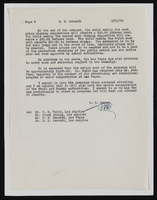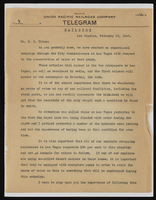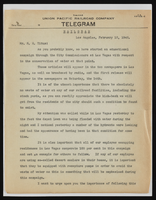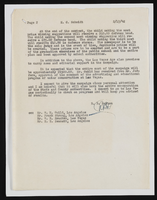Search the Special Collections and Archives Portal
Search Results
Randy Char oral history interview
Identifier
Abstract
Oral history interview with Randy Char conducted by Cecelia Winchell and Stefani Evans on December 15, 2021 for Reflections: The Las Vegas Asian American and Pacific Islander Oral History Project.
Randy discusses his family history, his childhood growing up in California, and his undergraduate education. He shares his employment history that ranged from selling life insurance to trading stocks and finally selling luxury real estate. Randy talks about pursuing an MBA program at Pepperdine University during the 2008 financial crisis and how his capstone project idea of luxury real estate lounges helped him to open his own brokerage in Las Vegas in 2014 before becoming a real estate broker for Sotheby's. Randy also shares his thoughts on diversity within Asian cultures and different Asian American Pacific Islander (AAPI) organizations that helped him to "reclaim his Asian identity" including the Asian Real Estate Association of America (AREAA) and the Leaders Forum.
Archival Collection

Meeting minutes for Consolidated Student Senate University of Nevada, Las Vegas, March 20, 1984
Date
Archival Collection
Description
Text

Transcript of interview with Doris, Gerald and Marcy Welt by Barbara Tabach, November 30, 2014
Date
Archival Collection
Description
Interview with Doris, Gerald "Jerry", and Marcy Welt by Barbara Tabach on November 30, 2014. In this interview, the Welts discuss how they came to Las Vegas in the early 1970s from California, and Eli Welt's pawnshop, Stoney's, which he acquired from Doris's father, Jerry Fox. Jerry and Marcy talk about how they met and came to Las Vegas, where Jerry worked for Harry Reid's law firm. They talk about the community that existed in Las Vegas at the time, and their involvement with B'nai B'rith.
Just before the start of the Great Depression, Doris Fox was born in Detroit, Michigan. At the age of fifteen, she met Eli Welt, and the two were married three years later in Alexandria, Louisiana, where Eli was stationed with the United States Army Air Corps. Eventually, Doris and Eli moved to southern California with their three children-Gerald (aka Jerry), Richard (aka Rick) and Susan (aka Sue). In 1971, after all their children were out of the house, Doris and Eli moved to Las Vegas. They followed Doris' father, Jerry "Stoney" Fox, who had moved to the city in the 1940s, and was one of the first entrants into the local pawnshop industry. Like many migrants to the city, Eli became active in the Jewish community, particularly with B'nai Brith and Jewish Family Service Agency. Doris and Eli's eldest son, Jerry, and wife, Marcy, moved to Las Vegas in 1972 with their two small children. Tiffany and Cory. Jerry and Marcy had met through a Jewish youth group as teenagers in Anaheim, California. Having just finished law school, Jerry found that legal career opportunities were plentiful in the growing city. His first job was as a law clerk with Harry Reid's law office, Beckley, DeLanoy, Jemison and Reid, later becoming an associate attorney. He assisted Reid as lieutenant governor and on his early political campaigns. Jerry left Beckley, DeLanoy, Jemison and Reid to work for Oscar Goodman's firm-Goodman, Snyder and Gang-focusing on civil litigation. In 1975, Jerry opened his own practice, continuing to specialize in civil ligation, and served as general counsel to Las Vegas Clark County Library District. Since their arrival, Marcy and Jerry have been dedicated to community service, particularly within the Jewish community. Both were active in youth programs at Temple Beth Sholom, Jerry even serving as youth commissioner and later, education director. Marcy worked with Edythe Katz at the Holocaust Resource Center and assisted with producing a film and training program for educators. Both are avid supporters of youth travel to Israel and work hard to ensure these opportunities continue to be available for those interested.
Text

Transcript of interview with Rosemary (Conner) Cleman by Beatrice Owens (Gillard), March 8, 1981
Date
Archival Collection
Description
Text
Cindy Baca oral history interview
Identifier
Abstract
Oral history interview with Cindy Baca conducted by Barbara Tabach on May 22, 2019 for the Remembering 1 October Oral History Project.
Cindy Baca, born and raised in Las Vegas, talks about her family and occupation as a librarian at Escobedo Middle School. Cindy's twin daughters were present and injured during the Route 91 Festival and October 1 shooting. She describes their experiences and the Random Acts of Kindness project she piloted at her school after the incident.
Archival Collection

Miguel Villarba oral history interview: transcript
Date
Archival Collection
Description
Oral history interview with Miguel Villarba conducted by David Islas on December 6, 2021 for Reflections: The Las Vegas Asian American and Pacific Islander Oral History Project. In this interview, Miguel Villarba shares his family's history growing up in Manila, Philippines and immigrating to the United States in 2016. He talks about first living in Chattanooga, Tennessee before moving to Las Vegas, Nevada to be near family when Miguel was in high school. Miguel Villarba shares stories of his grandfather's farm in Pangasinan, Philippines, the differences in city and town life across Manila, Chattanooga, and Las Vegas, and his educational plans. He also talks about Filipino culture and traditions, and racial discrimination.
Text




